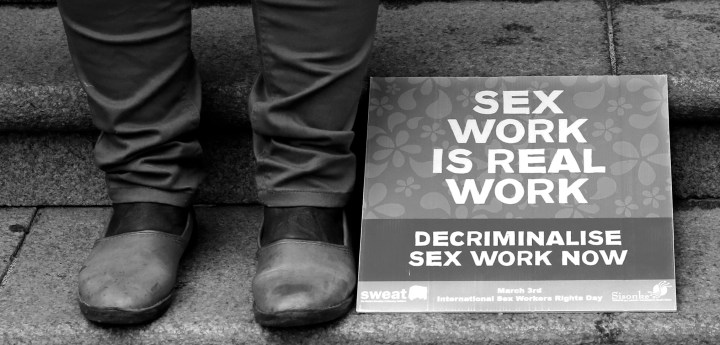MAVERICK CITIZEN OP-ED
Government must fast-track laws to decriminalise and protect sex workers

The pandemic showed some of the flaws in criminalising sex work and why it is so important to decriminalise it sooner rather than later. For example, sex workers were unable to work under national lockdown restrictions and received no government support, because they are not recognised as legitimate contributors to the economy.
Thembinkosi Gcoyi is the managing director of Frontline Africa Advisory. Linda Busuku is its stakeholder relations officer.
The South African government needs to seriously reflect on decriminalising sex work. Over the years it has shown a willingness to reassess matters that have previously been looked upon as cultural taboos, and instituted policies that shift how these matters are viewed or addressed. Notable examples include same-sex marriage, the termination of pregnancy, the legalisation of cannabis and the current debate around polyandry.
In the context of this article the term sex worker refers to those engaged in prostitution and excludes pornographic or webcam performers and others who might be construed as sex workers.
Sex workers are still pushed out to the periphery of society and are subjected to violence and discrimination without recourse to law enforcement. They also have very few means 0f support. A lot of the violence is deeply rooted in misogyny and the dehumanisation that arises from their work being stigmatised.
Covid smackdown
This has been worsened by the Covid-19 pandemic, which not only made it almost impossible for sex workers to earn an income but also saw them constantly arrested and harassed by police officers. Some found themselves facing mental health issues.
The Sisonke National Sex Workers Movement in South Africa has highlighted the plight of sex workers under the national lockdown restrictions as they were unable to work and received no government support, because they are not recognised as legitimate contributors to the economy. The pandemic showed some of the flaws in criminalising sex work and why it is so important to decriminalise it sooner rather than later.
South Africa has carried forward archaic laws on sex work which were passed by the apartheid regime and expanded upon by the Criminal Law (Sexual Offences and Related Matters) Amendment Act 32 of 2007. The statute criminalised both the client and the sex worker for partaking in the act of selling and purchasing sex. In 2002, the Constitutional Court handed down a judgment in the case Jordan v State which upheld the constitutionality of criminalising sex work.
Wind of change
In the past two decades, numerous stakeholders have had different conversations and opinions around sex work. In 2007 former police commissioner Jackie Selebi proposed the legalisation of sex work for the 2010 Fifa World Cup. The ANC Women’s League floated the idea of decriminalising sex work in 2012 and it was brought up again in 2015, through the Women’s Roundtable Discussion in Parliament.
Conversely, the African Christian Democratic Party’s Reverend Kenneth Meshoe argues that decriminalising sex work would only lead to increased abuse as well as human and drug trafficking.
The governing ANC has taken some initiative in discussing the subject. At its 2017 Nasrec conference, the party resolved that “the calls to decriminalise sex work must be subjected to a high-level discussion and engagement with relevant multiple stakeholders”, and that it would “continue to engage society on this to determine the societal norm”. It also declared that sex workers “must be protected”.
More recently, the ANC stated its intention to reflect on and prioritise interventions on gender-based violence in its Umrabulo 2020 NGC Special Edition publication. Unfortunately, this bold resolution has not found expression in government programmes, either through neglect or inertia on the part of bureaucrats responsible for translating the governing party’s programmes into government programmes.
Unprotected work
The Sex Workers Education & Advocacy Taskforce (Sweat) previously estimated that South Africa had between 132,000 and 182,000 active sex workers. This is a sizeable number of individuals engaged in economic activity which should have legal protections attached to it.
Sex workers, most of whom are women, are targets of gender-based violence and criminality. Most of their work happens in dark corners which enable criminal activity such as gender-based violence, robbery and even murder. Lack of legal protection precludes access to law enforcement as a recourse for such criminal conduct.
Legalisation and regulation of the sex industry would give sex workers the protection they require to exercise their economic rights and have full dominion over their bodies. At the same time, it would enable law enforcement, health and social development authorities the space to provide desperately needed services to sex workers.
According to the US Department of State’s 2020 Trafficking in Persons Report: South Africa, 377 people were identified as victims of trafficking in 2020, a rise from 2018’s 260 victims. Of this number 112 victims were exploited in sex trafficking. Trafficking has been a growing concern among South Africans for some time now and the decriminalisation of sex work would provide an opportunity for government to work with the sex industry to combat issues such as the exploitation of children in prostitution and trafficking for sexual abuse.
Collaborate, then legalise it
Legalisation will help to destigmatise a profession that puts food on many tables. It must not be forgotten that many sex workers enter prostitution out of necessity, not personal choice. Legalisation would afford sex workers the protections they are currently deprived of and improve their working conditions.
It would also allow government to establish mechanisms to help them improve their working conditions, afford them the protection of South Africa’s labour laws and easily provide aids such as helplines and counselling services for those who wish to leave this line of work.
Government should collaborate with and seek assistance from established organisations such as Sweat, among others, to navigate the landscape around sex work and come up with a proper legislative framework. DM/MC



















 Become an Insider
Become an Insider
Comments - Please login in order to comment.